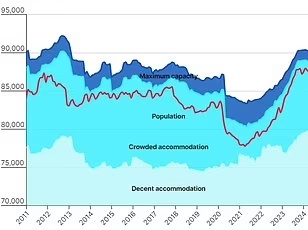Supermarket prices rose during the cost of living crisis and more increases are coming.

British Farmers Protest In London (Image: Getty)
Food manufacturers are urging the Government to help avoid price rises amid fears growing costs and tax hikes could add to higher bills at the checkout.
Global prices for basic goods such as vegetable oil, wheat and sugar have risen while poor weather in the UK threatens to increase the cost of dairy products.
Manufacturers are also facing pressure from decisions in Chancellor Rachel Reeves’ Budget, including increases in employer National Insurance contributions and the minimum wage, which supermarkets have already warned will force them to put up prices.
The Food and Drink Federation, which represents more than 1,000 firms, says investment in skills and digital technology is needed to help the industry improve productivity.
Balwinder Dhoot, its director of industry growth and sustainability, said: “The Budget has seen business costs increase and there’s also a range of global factors – from weather events to energy prices – that will have an impact on the cost of producing food and drink.
Don’t miss…
Pensioners to freeze in cold snap after Labour’s ‘cruel’ cuts [LATEST]
Courts in chaos as translators take control of proceedings [LATEST]
Andy Burnham presses Transport Secretary weekly to fix Northern rail chaos [LATEST]
Labour tell NHS bosses they can’t just keep asking for more money [LATEST]
“The best way to mitigate against this is the government doubling down on its growth agenda. There’s currently an untapped £14billion growth opportunity for UK food and drink manufacturers which can be achieved through productivity gains and investing in technology.
“Working with industry through its Industrial Strategy, the government can unlock this growth opportunity, helping keep prices low for consumers while generating good quality jobs in communities across the UK.”
The price of food on the shelves shot up when the cost of living crisis was at its height, with official figures showing the inflation rate specifically for food and non-alcoholic drinks reached a high of 19.2 per cent in March last year.
The rate has fallen significantly since then but is now creeping back up, and food and drink inflation rose from 1.3 per cent in September to 1.9 per cent last month.
But experts warn price increases could continue, partly due to global increases in the cost of basic commodities such as vegetable oils, wheat and sugar.
The Food and Agriculture Organisation of the United Nations says prices rose 5.5 per cent over 12 months, with vegetable oil up 7.3 per cent.
Global wheat prices have been hit by poor weather and the ongoing war in Ukraine.
Don’t miss…
Labour fear disaster like Democrats if they don’t learn from Harris mistakes [LATEST]
Big job lined up for former Tory leadership candidate James Cleverly [LATEST]
Fears over Ed Miliband’s plan for massive wind farm expansion [LATEST]
Defence Secretary John Healey reveals his son has joined the army [LATEST]
In addition, regulator Ofgem last week announced the cost of energy is to rise again, which will hit energy-intensive industries such as food manufacturing.
And manufacturers will be hit by the same cost increases affecting retailers, including an increase in employers’ National Insurance contributions and a major increase in the minimum wage, up 6.7 per cent, from £11.44 per hour to £12.21 from April 2025 for people over 21.
A letter to Chancellor Rachel Reeves signed by representatives for firms such as Tesco, Sainsbury’s, Asda and Morrisons last week warned: “The sheer scale of new costs and the speed with which they occur create a cumulative burden that will make job losses inevitable, and higher prices a certainty.”
Research by charity the Food Foundation shows that food prices are still 25 per cent higher than two years ago and a basket of basic food products that would have cost £40.99 at a supermarket checkout in April 2022 would now cost £51.51.




